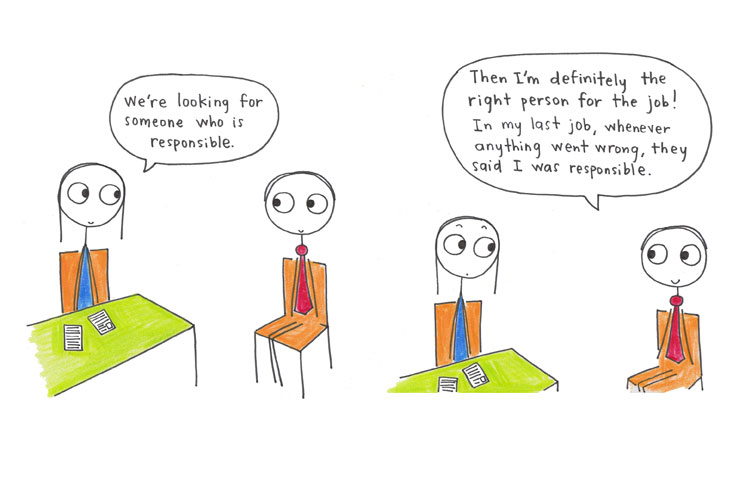Before sitting for an exam, if we even get a hint as to what questions we would have to tackle, we become so elated; we don’t even bother studying for it. And the result…let’s not go there. Job Interviews are not much different either. In one way or another, you will be asked the same questions you did thought about practicing.
Here is a list of some top ten frequently asked questions and how to tackle them.
1. The most difficult question of all: Tell me about YOURSELF?
This is often the opening question of any interview-interviewee discussion. What most candidates fail to realize is that the interviewer is not asking for what’s already there in your CV/Resume. You’re not supposed to reiterate that. In organizational jargon, it can be called a warm-up question. So, don’t waste your time and energy on this. Just focus on four main areas: Your early years, most recent education, work history and recent career experience. Focus on the last point more and avoid your personal life examples until and unless asked for.
2. What interests you about this job/why do you want to work for us?
This is “killing two birds with one arrow” question. The worst answer you can give here is one which lacks research, not only about the company needs but also about your skills and knowledge. The interviewer wants to know whether you have done your homework or not by researching about the organization prior to coming in for the interview. If you have done research, then your answer would revolve around the company’s success and how it was able to achieve growth, not only in profits but in corporate responsibility as well. If you just go in without research, and answer with “I love working and I like working with teams”- better start searching for another job.
3. Why did you leave your last employer?
This question requires you to stress only on the positives, overlooking all negative responses, except in the case of company closure, downsizing, merger, or acquisition. Be more assertive on subjects related to seeking new challenging roles, acquiring new skills, to pursue your goal of contributing to another organization you have always admired to work for.
4. Why do you think you would do well at this job? Or what can you do for us that someone else can’t? Or why should we hire you?
This is your question, your moment of truth. There’s no need to get carried away here, as this is a make or break question. You have all rights, maybe even an obligation, to strut your own self. You can tell the interviewer about your past accolades and how you managed to negotiate a tough deal with a rigid client or how you have maintained a reputation with your previous employees of being someone who gets everything done right and on time. You should mention specifics from your resumes and tell them that your ability to analyze critical situation helps you in solving them with efficiency. Your case needs to be a compelling case, because the interviewer doesn’t have much time to make one.
5. Give me an example of a time when you had to __________. Now, the blank can contain anything. For example: you had to take initiative … you had to deal with a difficult customer … you had to respond to a crisis … you had to give difficult feedback to an employee … you had to take a risk … etc. etc.
This question highlights the recent trend in interview: Behavioral Type Questions. Most candidates confuse the word example with hypothetical situations. That’s not what’s required. These questions probe about what you have done in the past and are not related to what you are going to do in the future. The key is to prepare for these type of questions before hand. You need to assess what skills you are going to need in the job and what challenges you might face. The interviewer wants to see how much you pro-active or reactive you are. So, before the interview, think of certain examples, real past examples, which you can use to point to as evidence that you are capable of meeting certain situations that may arise at work. Include three things in your answer: what challenge you faced, how you responded to it, and what outcome you achieved.
6. Where do you picture yourself and your career in three, five or seven years?
It’s the least most risky questions arising from the behavioral set of questions. What candidates fail to understand here is that the interviewer is going to assess, whether you are a potential fit for the company or not and whether you know where you are going and how this job will help you get there. You need to highlight your ambitions and career goals and plans. If you’re still studying, include your educational objectives as well. You should touch upon company’s culture and vision, adds a flare to the talk, especially if giving an interview to your future boss.
7. You have not done this sort of job before/do not have much experience related to the job. How will you cope/succeed?
This is a question usually asked when switching industries or to new graduates. What candidates fail to realize is that the interviewer found something of value in the candidate to give him/her a chance. The answer interviewer looks for circles around that “value”. You need to realize what is that one skill or achievement which sets apart from all the others, AND YOU HAVE ACTUALLY MENTIONED IT ON YOUR CV/RESUME. The point is to read your credentials before going in. Remember, if you were called for an interview for a job you have not done before, it means the interviewer found something interesting about you. Now, it’s your turn to find that something out about yourself.
8. Do you think you have had a successful career to date?
You must present a positive, yet modest, picture over here. Do not get carried away in overstating your case. Never say “I can’t think of a better time in my life. I am on seventh heaven at the moment!”- The interviewer would realize you are making a fool out of him/her…or maybe, yourself. What interviewers want to hear is what you are capable of achieving when you are at the top of your game and whether or not you have achieved anything at all and are competent with them. You can say that, given the ups and downs of life, you’re happy with all that came to your way and how you have progressed so far. Don’t complain or whine about your regrets.
9. What are your salary expectations?
This question represents an open minefield, where the chances of an explosion are quite high. But, you can diffuse the possibility by being a bit realistic. You need to be careful in assessing the post applied for, your experience, and your past salary. For fresh graduates, your education and skill is what matters the most. Prior research plays a vital role in this aspect. Do some prior research about the industry and your prospective employer. Try to find out the average pay range in the industry, in this era, it’s only a few clicks away. Combine this data with the pay scale of people falling in your experience and education range; this should give you a fare idea of what to quote. If switching job in the same industry, then consider quoting at least 25 percent more than your last job’s salary. You need to be realistic to make the interviewer believe that you are not firing from a long range, but have done extensive research.
10. Have you got any questions you want to ask us?
The worst answer to give: “No.” You must take advantage of this situation and ask the interviewer about the roles of the position and how much importance the position/department is in the eyes of the management. This should give you a good idea as to when to expect the position being filled-up. The more important the position, the longer it may take. You can ask them about how a company measures and defines success and who measures it. Even if you go completely blank at that time, then you may conclude with something like: “I have no questions at the moment, but if I do have some later on, may I give you a call and ask?” Close this by saying: “I hope I have answered all your questions, is there anything else you wish me to clarify upon?” Now, you’ve created a certain opening for a second contact and the interviewer is again in charge of closing the discussion.
Present day employers look to hire candidates that are a perfect fit to their corporate culture and management objectives. You might possess the highest level qualifications for a position, but you won’t be offered a job if you project yourself as a poor fit for the company. So, try using these questions to your advantage. You must remember that the main key successfully answering any and all interview questions is to LISTEN CAREFULLY! First understand what is being asked, and then take a moment to think through before speaking, so that you make sense to the interviewer.












